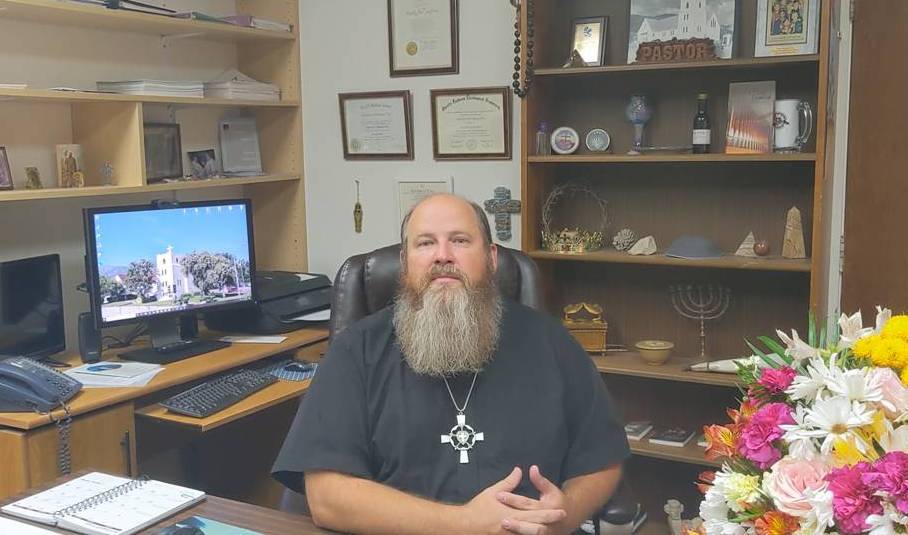During the festival of Pesach (Passover), our Jewish brothers and sisters around the world connect themselves to one of the greatest stories ever told by celebrating the Seder, which is an interactive dinner where the events of the Exodus from Egypt are retold. And for Christians, this annual liturgical meal also points to Mashiach Yeshua (Christ Jesus), and this is perhaps in no place more clearly illustrated than in the tradition of hiding the broken afikoman matzah bread (also spelled afikomen).
For the uninitiated, one of the traditions of the Passover Seder Meal is a special bag called a matzah tash that has three compartments, each containing a whole matzah (unleavened bread). The tradition is to take the middle matzah out and break it in half. Half of the matzah is placed back in the matzah tash, but the other half is wrapped in a linen napkin. This piece is called the afikoman (from the Greek epikomon), meaning “that which comes after,” and it’s considered a substitute for the ancient Passover sacrifice which was the last thing eaten at the Passover Seder during the historical eras of the First and Second Jerusalem Temples. The afikoman is then hidden by an adult for the duration of the first part of the Seder, and after dinner the children search for it and bring it back to their parents to be redeemed for a prize. Traditionally, the Seder cannot end until the afikoman is found.
The searching and finding of the afikoman is a beloved Passover tradition, but Judaism has no authoritative explanation as to the origin or the meaning of the afikoman. A number of diverse and often conflicting theories have emerged over the centuries. One tradition holds that the three pieces of matzah represent the three casts of Judaism: the Israelites, the Levites, and the Kohanim (the Priests). Another theory is that the three matzah breads represent Abraham, Isaac, and Jacob. But these are later innovations; they are not mentioned in either the Mishnah or the Talmud (the authoritative writings of Rabbinic Judaism).
Moreover, why is the middle matzah broken? What would breaking the Priests or Isaac accomplish? Some rabbis believe that breaking the matzah represents the splitting of the Red Sea, but if that’s the case why is a half piece of the ocean hidden away? Lastly, one tradition even says that the afikoman is hidden so that it doesn’t get eaten by accident before the meal is over.
Of course, none of these theories are truly authoritative or satisfying. However, there is one other explanation that makes perfect sense, and it ties all of the symbolism together and tells a cohesive story.
First presented by Austrian-Jewish scholar Robert Eisler in 1925, the most coherent explanation of the tradition of the afikoman was likely conceived by the First Century Jewish followers of Mashiach Yeshua (Christ Jesus) and that the afikoman is a symbol of Jesus himself. In fact, the very texture of the matzah bread and the way it’s prepared is indicative of Jesus. Matzah has stripes burned into it from the oven rack and it must be pierced with holes to prevent it from rising. In the same way, our Lord Yeshua was literally striped by the lashes of a whip, and he was pierced by nails and a spear.
In addition, the three compartments of the one matzah bag represent the three ways we experience the One Almighty God as the Father, the Son, and the Holy Spirit — our Creator, Redeemer, and Sanctifier. And the middle matzah (representing the Son of God) is broken, just as Yeshua our Savior was broken for us (see Isaiah 53). And after his death on the cross, Yeshua’s body was wrapped in a linen shroud and buried away for three days until his resurrection. So too, the afikoman is wrapped in a linen cloth and hidden until the end of the Passover Seder Meal.
When the meal ends, the children search for the afikoman to gain the prize that comes from finding it. In this act, the salvation and redemption that comes through the sacrificial offering of the Divine Messiah is illustrated. And how fitting it is that it’s the children who seek the afikoman, for Jesus taught that the Kingdom of Heaven belongs to such as these (Matt 19:14) and that we all must become like little children to enter the Kingdom (Matt 18:3). And just as the Seder cannot end until the afikoman is found, the Kingdom of God will not be established in its fullness until the great return of The Universal Afikoman (Jesus the Messiah).
Now it’s true that the word “afikoman” is often translated as “that which comes after,” but according to Prof. David Daube (a preeminent Twentieth Century scholar of Biblical law) a better origin and definition of afikoman is the Greek word aphikomenos which means “the one who has arrived.” And of course, if nothing else, we know that our risen Lord Yeshua is with us always, and that he has identified the matzah bread of the Passover with his very own body and mystical presence. For at his Last Supper (his Passover Seder that he ate before he suffered) Jesus took the matzah, gave thanks, and broke it, and gave it to all of them, saying, “This is my body, which is broken for you; do this in remembrance of me” (First Corinthians 11:24).
Together in Christ, Pastor Tim

